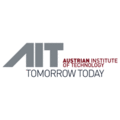Vienna (OTS) –
The project “Development of additional materials for additive manufacturing of large metal components” is recognized as one of the leading innovations in the “Extra-university Research” category
Great success for AIT researcher Thomas Klein and his colleagues in the group „Wire-based Additive Manufacturing“ am LKR light metal competence center Ranshofen of the AIT Austrian Institute of Technology: The project “Development of additional materials for additive manufacturing of large metal components” was selected as one of the five outstanding contributions in the “Extra-university research” category for the renowned Houska Prize of the B&C Private Foundation.
Additive manufacturing as a manufacturing process of the future
Additive Manufacturing (AM) stands for a new manufacturing process in which a component is manufactured generatively based on 3D design data through defined material application of powders or wires. Compared to the traditional, subtractive approach to component manufacturing, the technology has enormous potential, especially in terms of cost and resource efficiency – especially in terms of drastically shortening manufacturing and product development cycles and reducing the necessary use of materials.
One process used for additive manufacturing of metals is so-called “wire-based additive manufacturing” (WAM), also known as directed energy deposition (DED) with wire. Conventional welding equipment is adapted in such a way that it is possible to produce components by directly applying metal from welding wires at comparatively high build rates and theoretically unlimited component sizes. At the LKR Light Metal Competence Center Ranshofen, standard welding consumables based on aluminium, magnesium and titanium as well as special wires developed and manufactured in-house are processed.
Large metal components from the 3D printer
The increased use of DED processes for the production of large metal components is becoming increasingly important. These processes enable, among other things, the modification of conventionally manufactured semi-finished products, which offers both economic and ecological advantages. In this context, the use of wire as a filler material comes into particular focus. Compared to powder, wire is more economical and poses fewer health risks. In addition, wire is characterized by better material purity, which leads to higher quality end products. DED processes thus combine the advantages of the latest welding technologies, robot automation, computer-aided design and manufacturing. In this way, large 3D components can be manufactured from new DED-compatible welding wires in a material- and energy-saving, high-quality, cost- and time-efficient manner, especially when using light metals as additional materials.
Strategic research focus at the LKR
The integration of conventional materials into these innovative processes requires the development of novel alloys that meet the specific requirements of the DED process. These not only have to achieve the mechanical properties of conventional materials, but also meet the special requirements of additive manufacturing, such as rapid solidification conditions and repeated reheating
A strategic research focus was therefore established at the LKR Light Metal Competence Center in Ranshofen with the significant participation of Thomas Klein. The multidisciplinary research team focuses on three main dimensions: developing tailor-made light metal alloys, creating smart, low-batch wire manufacturing routes and demonstrating the processability of these materials in industry-relevant DED processes.
„Wire-based additive manufacturing processes will make production chains more flexible and increase the sustainability of manufacturing processes in the future. The necessary development of novel materials and material systems is currently being carried out at the AIT Austrian Institute of Technology. The development approach used is unique worldwide and gives business partners a significant competitive advantage. The fact that we have now been nominated for the Houska Prize in the ‘Extra-University Research’ category is a great confirmation of our work
“, says Thomas Klein.
AIT Managing Director Brigitte Bach adds: “Research & development is the central driver of innovation for the economy and society, secures jobs and prosperity and thereby strengthens Austria as a location. Applied research provides solutions to the major challenges of our time. A key factor for success is close cooperation between research and industry and a bridge between scientific knowledge and practical implementation. We are very pleased that the path that AIT is taking in applied research is also recognized by the Houska Prize, Austria’s most important prize for applied research. Congratulations to Thomas Klein and his team!”
About the B&C Private Foundation
Die B&C Private Foundation is an independent Austrian foundation that has pursued the goal of promoting Austrian entrepreneurship since it was founded in December 2000. This is achieved in particular through long-term majority holdings via the B&C Group in the Austrian industrial companies AMAG Austria Metall AG, Lenzing AG and Semperit AG Holding and through investments in Technology and growth companies. The B&C Private Foundation promotes Austria as a business and business location through numerous projects and initiatives that actively contribute to improving the economic and legal framework conditions in Austria. These include, among others, the Houskapreisthe location initiative eXplore! and the MEGA Educational Foundation.
About the Houska Prize
The Houska Prize was launched by the B&C Private Foundation in 2005 to promote economically relevant research and innovations. In doing so, B&C would like to contribute to strengthening Austria as a business location and also express its appreciation for the excellent research work carried out in this country. In addition to innovation performance, the economic effect is an important criterion when awarding the Houska Prize. The Houska Prize is the largest private prize for applied research in Austria: To date, the main prize has been awarded to 26 top researchers and a total of 6.33 million euros has been distributed in the form of prize money or vouchers.
Questions & Contact:
Mag. Florian Hainz BA
Marketing and Communications
AIT Austrian Institute of Technology
Center for Transport Technologies
T +43 (0)50550-4518
florian.hainz@ait.ac.at I http://www.ait.ac.at/
Daniel Pepl, MAS MBA
Corporate and Marketing Communications
AIT Austrian Institute of Technology
T +43 (0)50550-4040
daniel.pepl@ait.ac.at I www.ait.ac.at
